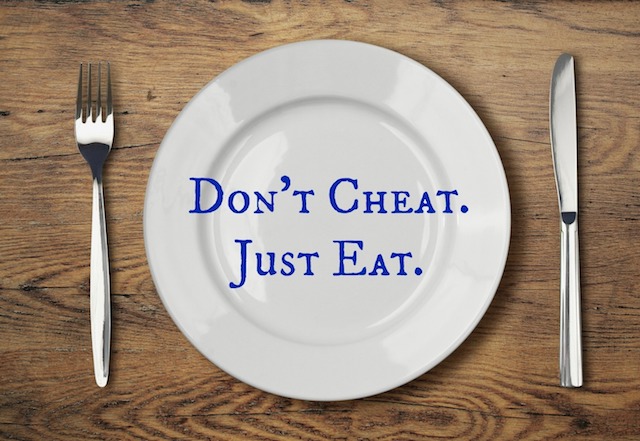
In the last week, numerous people I’ve talked with—friends, clients, my esthetician—all have talked about how they’ll let themselves cheat this holiday season when it comes to what they’ll put on their plates.
What they mean of course, is that they’ll eat foods that don’t fall into their usual diets, which might include gluten-laden baked goods, dairy products and sugar.
If you are someone who is planning to cheat over the holidays (or any day, really), I’m asking you not to. And I’m also asking you to eat whatever the f*ck you want. Really, my request is to stop using the term “cheating” when it comes to food.
Our language matters—and in a society where eating disorders are rampant, and we are already overloaded with guilt from countless external sources, why use food to pile on yet another serving of shame?
Cheating is never a good thing. Just think about it in other contexts—tests in school, lovers, and so on. There is inherently shame and a sense of wrongdoing implied by the word, and frankly there’s no food in the world that should eat away at our sense of self-worth. Nothing inspires more compassion and heartbreak in me than when I hear people talk about “cheat days.” No more cheat days, please. Let’s just love ourselves every day. We can’t do that on cheat days.
When it comes to holidays, the truth is the whole point is to eat a little differently—that’s part of what sets a holiday apart from every other day. What characterizes holiday foods across cultures and throughout centuries? Generally, they are richer, sweeter and more decadent than anything we might put on our plate on a typical weeknight. That’s the whole point.
I’m not advocating to eat mindlessly, but the truth is you can still eat mindfully and have a little pie—and you can even have it with whipped cream, if that will make you happy. A lot of it comes down to moderation and the portions we choose. Having a sliver of pie (and whipped cream too!) isn’t going to change our lives in any substantial way. And guess what? If we have a really big piece, we’re going to be just fine too.
Repeat after me: “My body is resilient and can handle a holiday meal.” Truly mindful eating is not just about monitoring what’s on our plates, but how we respond to it emotionally as well.
Guilt around food is not simply pointless; it actually can be harmful. If we finish a meal obsessing about eating stuffing with gluten in it, or having had two servings of dessert, we’re kicking our autonomic nervous system into high gear. When this happens, the capacities of the digestive organs are inhibited, and instead of metabolizing and assimilating our food, it’s processed in a much less complete and efficient way. Simply put: self-judgment will always trigger the release of stress signals and neurotransmitters, and these get in the way of a healthy digestive response.
In the long view of life, what’s on our plate matters, as poor food choices repeatedly over time are linked to a host of conditions most of us hope to never encounter. When it comes to one special meal—whether it’s Thanksgiving or Christmas dinner or another occasion—what is most important in my view is not what’s on our plate, as much as how we treat ourselves after consuming it.
So eat, drink, and be merry. Let’s not allow ourselves to be consumed by guilt. If you find your mind spiraling with critical thoughts after your meal today, just remind yourself of my favorite mantra: “There’s always the next meal.”
Each meal is an opportunity to make different choices, so if something doesn’t feel good today, try something different tomorrow.
~
Author: Meredith Klein
Images: Author’s Own
Editor: Travis May











Read 0 comments and reply